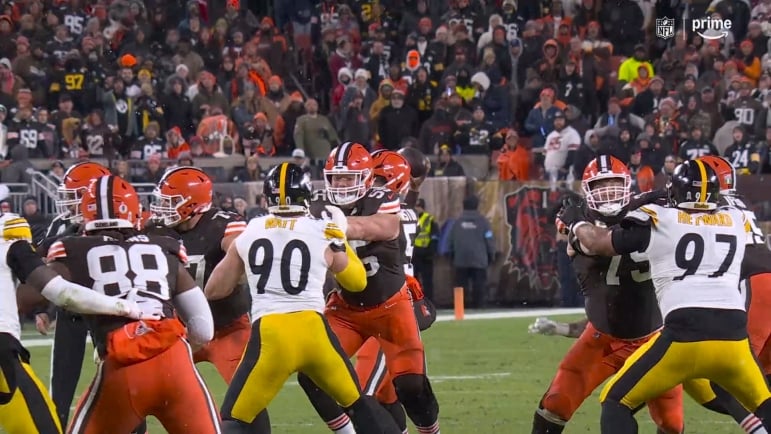Player: T.J. Watt
Stock Value: Down
Reasoning: Pittsburgh Steelers star T.J. Watt did not play like one on Thursday against the Cleveland Browns. In fact, he played quite arguably his worst game of the season, offering very low impact. Of course, Watt is judged on a steep curve given his status, and his competition didn’t help. With Myles Garrett notching three sacks and Muhammad Ali-ing after the game, it only made him look worse.
The Pittsburgh Steelers pay T.J. Watt an extraordinary salary to do extraordinary things. On Thursday against the Cleveland Browns, T.J. Watt did not earn his paycheck.
That might sound harsh, but that is the reality for elite players. If their absence of difference-making plays contributes to a losing effort, they must share the blame. Conversely, nobody is going to pin this loss on Payton Wilson or Larry Ogunjobi or Isaac Seumalo. But when T.J. Watt doesn’t make difference-making plays and the opposing team scores a game-winning touchdown in the final minutes, you notice.
And the Steelers did play T.J. Watt for 95 percent of the snaps on Thursday against the Browns. That’s his third-highest snap share of the season, yet he struggled to make an impact. While he recorded four tackles, including one for loss, he hardly even introduced himself to Jameis Winston.
As you might expect, the Browns did give RT Jack Conklin a good amount of help against Watt. But perhaps he didn’t need it, because he handled Watt very well on his own. You might argue that the Browns endeavored to get the ball out quickly, but even that was limited.
Jameis Winston took nearly three seconds to throw per pass attempt. He dropped back 29 times and only scrambled once, taking one sack by Nick Herbig. According to Pro Football Focus, Winston was under pressure over 40 percent of the time, but little of it was from T.J. Watt. But everyone has a low-impact game from time to time, and there’s no doubt he will redeem himself.
As the season progresses, Steelers players’ stocks rise and fall. The nature of the evaluation differs with the time of year, with in-season considerations being more often short-term. Considerations in the offseason often have broader implications, particularly when players lose their jobs, or the team signs someone. This time of year is full of transactions, whether minor or major.
A bad game, a new contract, an injury, a promotion—any number of things affect a player’s value. Think of it as a stock on the market, based on speculation. You’ll feel better about a player after a good game, or worse after a bad one. Some stock updates are minor, while others are likely to be quite drastic, so bear in mind the degree. I’ll do my best to explain the nature of that in the reasoning section of each column.








